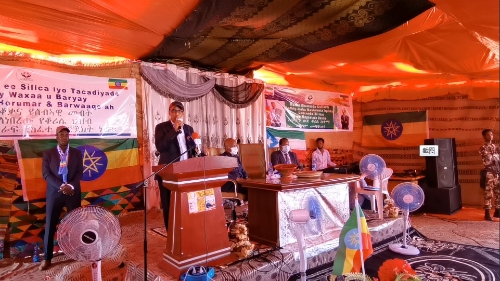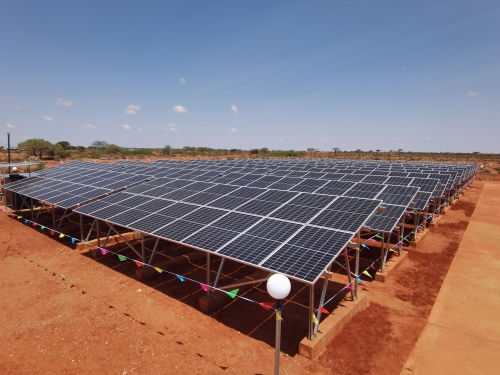The completion ceremony for four Chinese-installed off-grid photovoltaic power plants took place on Oct 8 in the Somali region of the East African republic of Ethiopia.
The project was undertaken by POWERCHINA Hebei Engineering Corporation Limited, a subsidiary of POWERCHINA.
The dignitaries who attended the ceremony and cut the ribbon were Mustafa Muhummed Omer, head of the Somali region; Seleshi Bekele Awulachew, Minister of Water, Irrigation and Energy in Ethiopia and Shiferaw Telila, CEO of Ethiopian Electric Utility.
 |
|
The completion ceremony for the four off-grid solar power plants in Ethiopia takes place on Oct 8. [Photo/POWERCHINA] |
Ethiopia's TV stations covered the completion ceremony extensively.
This is the first pilot project funded and promoted by the World Bank in Ethiopia, being part of a wider project that will establish off-grid solar plants in 12 unpowered villages and towns.
Installation of the solar panels and associated infrastructure in the towns and villages of Albasa, Mino, Qorile, and Ungoge officially started in November 2019.
The work included the construction, installation and commissioning of photovoltaic power equipment, as well as six months of trial operations and maintenance.
 |
|
One of the four off-grid solar power plants that are now fully functioning. They were installed in remote areas of Ethiopia by POWERCHINA Hebei Engineering Corporation Limited. [Photo/POWERCHINA] |
The four stations are all located in the remote border areas of Ethiopia. They were completed in the face of complex terrain, impassable roads, harsh weather and lack of materials -- as well as the challenge of fighting the COVID-19 epidemic this year.
Facing these difficulties, the company successfully completed the project within strict requirements. The project became the first to be completed and put into operation of the 12 planned off-grid solar power stations and won praise from the government of Ethiopia.
The power plants will provide electricity to more than 8,000 households in villages far away from the main network, for work and daily living -- greatly improving the livelihoods of remote residents, while reducing carbon dioxide emissions and alleviating the local power supply shortage.